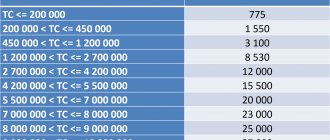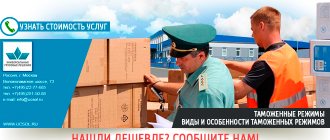2.1.customs warehouse.
Customs warehouses are specially designated and equipped premises and (or) open areas for storing goods under customs control without paying customs duties and taxes. Customs warehouses are a customs control zone and must comply with the requirements established by Article 225 of the Labor Code of the Russian Federation: premises and (or) areas intended for use as a customs warehouse must be arranged and equipped in such a way as to ensure the safety of goods and prevent access to them by unauthorized persons , as well as ensure the possibility of carrying out customs control in relation to these goods. The location of customs warehouses is determined taking into account the interests of trade organizations and other interested parties.
Customs warehouses can be open or closed. Open warehouses are those warehouses that are available for storage of any goods and use by any persons. Closed type - if they are intended for storing goods of the owner of the customs warehouse. Any goods can be stored in a customs warehouse, with the exception of goods prohibited by Russian legislation for import or export from Russia.
The owner of a customs warehouse can be a Russian legal entity included in the Register of Owners of Customs Warehouses.
Goods can be stored in a customs warehouse for three years.
Operations performed with goods placed in a customs warehouse:
- To ensure safety (cleaning, drying, ventilation).
- With the permission of customs, operations may be carried out to prepare goods for sale and transportation (sorting, splitting batches, labeling, transshipment).
Formation of customs and near-customs logistics infrastructure
The implementation of the logistics approach in regulating export-import commodity flows is ultimately achieved by creating logistics systems in the field of foreign trade and ensuring their effective functioning. The important features that distinguish the customs logistics system (CLS) from traditional ones include the following:
— logistics of customs clearance and customs control of export-import commodity flows should be carried out taking into account the relationships with larger foreign trade logistics systems, which include customs systems and with which they are connected by a common goal;
-projects for creating TLS should be assessed based on opportunity costs or the degree of deviation from optimal customs regimes;
— optimal TLS projects cannot be created only by making fragmentary changes to the existing procedures for customs clearance and control of export-import commodity flows. It should be based on management actions that are rational for all participants in foreign economic activity;
— the process of customs clearance and customs control of foreign trade commodity flows must be carried out purposefully and continuously. At the same time, it is necessary to eliminate the negative consequences of creating TLS.
All this indicates that it is necessary to create a logistics mechanism for managing the entire sphere of foreign trade, ensuring the effective functioning of the macro-logistics system of customs in Russia. At the same time, the most important elements of this system include methods of tariff and non-tariff regulation, business entities carrying out export, import or intermediary operations in the field of foreign trade, relevant government bodies, and end consumers of goods and services. Essentially we are talking about customs and near-customs infrastructure. Infrastructure is understood as a set of buildings, structures, systems and services necessary for the functioning of sectors of material production and ensuring the functioning of society.
Customs infrastructure is a set of institutional, social structures and activities, technical means of customs control, examination and communication, information systems, material and technical base of customs authorities, ensuring the conditions for customs regulation of foreign trade activities, the functioning of the customs system as a whole and, in particular, the implementation of customs affairs.
The main directions of development of customs infrastructure are:
— arrangement of the State border of the Russian Federation;
— creation of modern warehouse customs and logistics terminals;
— placement of customs authorities of the Russian Federation in premises that are federal property;
— development of stationary and mobile inspection and inspection complexes;
-introduction of new information and technical means to support the activities of the customs authorities of the Russian Federation, etc.
Near-customs infrastructure is a set of commercial and government structures, types of activities, information systems, material and technical base, providing intermediary customs and near-customs services that help improve the efficiency of export-import operations for the movement of goods and vehicles across the customs border. The infrastructure near customs includes a customs carrier, a customs broker (representative), the owner of a temporary storage warehouse, the owner of a customs warehouse, and the owners of duty-free shops.
A customs representative is a legal entity of a member state of the customs union that carries out customs operations on behalf and on behalf of the declarant or other interested parties, who is entrusted with the obligation or granted the right to perform them.
The conditions for inclusion of a legal entity in the register of customs representatives are:
1. the presence on the staff of this person of at least 2 employees who have a document confirming their compliance with the requirements established by the legislation of the member states of the customs union;
2. the presence of an insurance contract for the risk of one’s civil liability, which may arise as a result of damage to the property of the represented persons or violation of contracts with these persons. The amount of the insured amount is determined by the legislation of the member states of the customs union;
3. presentation of security for the payment of customs duties and taxes in an amount equivalent to at least one million euros;
4. compliance with other requirements and compliance with other conditions established by the customs legislation of the Customs Union.
Customs carrier is a legal entity of a member state of the customs union that transports goods under customs control.
The conditions for inclusion of a legal entity in the register of customs carriers are:
1. carrying out by this person the activity of transporting goods for at least 2 years as of the date of application to the customs authority;
2. provision of security for the payment of customs duties and taxes in an amount equivalent to at least two hundred thousand euros;
3. availability of a permit to carry out cargo transportation activities;
4. ownership, economic management, operational management, lease of vehicles used for the transportation of goods, including vehicles suitable for transporting goods under customs seals and seals;
5. availability of an insurance contract for the risk of its civil liability;
6. absence of facts of bringing to administrative responsibility within 1 year before the date of application to the customs authority for offenses in the field of customs affairs, defined by the legislation of the member states of the customs union;
7. compliance with other requirements and compliance with other conditions established by the customs legislation of the customs union and (or) the legislation of the member states of the customs union.
The owner of a temporary storage warehouse is a legal entity of a member state of the customs union that carries out storage of goods under customs control in the cases and under the conditions established by the customs legislation of the customs union.
The conditions for including a legal entity in the register of owners of temporary storage warehouses are:
1. ownership, economic management, operational management or lease of premises and (or) open areas intended for use as a temporary storage warehouse;
2. availability of an insurance contract for the risk of one’s civil liability, which may occur as a result of causing damage to the goods of other persons in storage, or violation of other terms of storage agreements with other persons;
3. absence on the day of application to the customs authority of an unfulfilled obligation to pay customs duties and penalties;
4. absence of facts of bringing to administrative responsibility within 1 year before the date of application to the customs authority for offenses in the field of customs affairs, defined by the legislation of the member states of the customs union;
5. compliance with other requirements and compliance with other conditions established by the customs legislation of the customs union and (or) the legislation of the member states of the customs union.
The owner of a customs warehouse is a legal entity of a member state of the customs union that stores goods under customs control.
The conditions for including a legal entity in the register of owners of customs warehouses are:
1. ownership, economic management, operational management or lease of premises and (or) open areas intended for use as a customs warehouse;
2. availability of an insurance contract for the risk of its civil liability;
3. absence on the day of application to the customs authority of an unfulfilled obligation to pay customs duties;
4. absence of facts of bringing to administrative responsibility within 1 year before the date of application to the customs authority for offenses in the field of customs affairs, defined by the legislation of the member states of the customs union;
5. compliance with other requirements established by the customs legislation of the Customs Union.
The owner of duty-free shops is a legal entity of a member state of the customs union, which carries out the storage and retail sale of goods placed under the customs procedure of duty-free trade.
Thus, the development of near-customs infrastructure that provides services within the framework of customs legal relations is determined by the needs of the market and foreign economic turnover. Fulfillment of the economic conditions for admission to carrying out activities allows persons included in the register to act as a guarantor before the customs authorities for the represented person in terms of ensuring the payment of customs duties, which allows reducing the costs of a participant in foreign trade activities.
2.3.customs broker (representative).
Customs broker (representative) is an intermediary who carries out customs operations on behalf and on behalf of the declarant or another person who is entrusted with the duty or who is granted the right to perform customs operations. A customs broker (representative) can be a Russian legal entity included in the Register of Customs Brokers (Representatives).
A customs broker has the right to limit the scope of its activities to the performance of customs operations in relation to certain types of goods in accordance with the Commodity Nomenclature of Foreign Economic Activity, or in relation to goods moved across the customs border by certain types of transport, as well as the performance of individual customs operations or a region of activity within the region of activity of one or several customs authorities.
Lecture No. 1-2
State government educational institution
higher professional education
«RUSSIAN CUSTOMS ACADEMY"
Department of Economic Theory
in the discipline "Infrastructure of customs authorities"
on the topic: “Subject, methodology and conceptual apparatus of the course
"Infrastructure of customs authorities"
Lyubertsy
2013
Table of contents
INTRODUCTION 4
1. Concept, objects and infrastructure system of customs authorities 5
1.1.Customs infrastructure: approaches to the concept 5
1.2. Objects and customs infrastructure system 11
2. Impact of customs infrastructure on economic growth 18
2.1. Impact of customs infrastructure on economic growth 18
2.2.Factors influencing the development of customs infrastructure. 20
20
Russia's transition from centralized economic management to a market mechanism necessitated radical changes in all areas of public administration. This process is difficult, which is reflected in the socio-political and economic situation in Russia, its geopolitical and geo-economic situation, which continue to be complex and characterized by instability. The liberalization of foreign economic relations and trade operations, the transition of the domestic economy to market relations required fundamental changes in the nature of the activities of the customs service of the Russian Federation, turning it into a real instrument of state regulation of foreign trade. 20
Infrastructure is a factor of production that has a significant impact on the well-being of a country. Modern customs policy proceeds from the fact that foreign economic activity, trade and customs affairs require the rational placement of customs infrastructure facilities, the systematic and efficient use of material, labor and financial resources, ensuring the comprehensive development of the country’s economy as a whole and its economic regions in order to increase the productivity of social labor , improving the well-being of the population and improving the environmental situation. The placement of customs facilities throughout the country should be carried out on the basis of principles reflecting both the requirements of objective economic laws and state policy - foreign, military, environmental, sanitary and others. At the same time, customs organizations solve their specific auxiliary tasks of providing foreign trade activities, trade, tourism and other types of activities with relevant services in such a way that the highest national economic efficiency is achieved. 20
The practice of locating customs organizations takes into account a system of natural, economic, geographical, socio-historical, sanitary-ecological, organizational and other factors. 21
The group of economic factors includes: public need for customs services and the possibility of satisfying it on the basis of existing customs organizations; labor resources; possibilities of scientific and technological progress. 21
Geographic factors include the properties of the territory, territorial location and combination of objects. They, in turn, are divided into physical-geographical (natural) and economic-geographical. 21
Economic-geographical factors include economic - and transport - geographical location, the value of land, opportunities for production development, the degree of development of production infrastructure, the possibility of construction, and more. 21
Socio-historical factors include the level of development in the area of the non-production sector and other factors. 21
Organizational factors for the placement of customs affairs cover forms of territorial organization of the customs service and the creation of new customs offices and posts. 21
Foreign policy, military, sanitary and environmental factors, law enforcement and others are also taken into account. 21
21
2.2.temporary storage warehouse.
Temporary storage warehouses are specially designated and equipped premises and (or) open areas for storing goods. Temporary storage warehouses are a customs control zone and must comply with the requirements established by Article 107 of the Labor Code of the Russian Federation: premises and (or) areas intended for use as a temporary storage warehouse must be arranged and equipped in such a way as to ensure the safety of goods and exclude access to them unauthorized persons, as well as ensure the possibility of carrying out customs control in relation to these goods. Temporary storage warehouses should be located in reasonable proximity to transport hubs and highways. They must be adjacent to a protected area equipped for parking vehicles transporting goods for the time necessary to complete internal customs transit.
Temporary storage warehouses can be open or closed. Open warehouses are those warehouses that are available for storage of any goods and use by any persons. Closed type - if they are intended for storing goods of the owner of a customs warehouse or for storing certain goods, including those limited in circulation and (or) requiring special storage conditions. Any foreign goods can be placed in temporary storage warehouses, including those imported into the customs territory of the Russian Federation in violation of import bans established in accordance with the legislation on state regulation of foreign trade activities.
The owner of a temporary storage warehouse may be a Russian legal entity included in the Register of Owners of Temporary Storage Warehouses.
The temporary storage period for goods is two months.
The release of goods from the warehouse is carried out in the presence of a customs declaration with an o and an accounting document (DU) with the same mark; with a customs receipt order (CRO) issued with the same mark and DU; in the presence of DCD; in the presence of a certificate of responsible storage.
2.4.customs carrier.
The customs carrier transports goods under customs control. A customs carrier may be a Russian legal entity included in the Register of Customs Carriers.
The customs carrier has the right to limit the region of its activities to the region of activity of one or more customs authorities. Depending on the region limited, customs carriers can be:
- zonal - within the activities of one customs office.
- regional – within the scope of activities of the regional customs department.
- All-Russian – within the scope of activities of the Federal Customs Service of the Russian Federation.
Bibliography
- Anurin, V. Marketing research of the consumer market / V. Anurin, E. Evtushenko, I. Muromkina. - M.: St. Petersburg: Peter, 2021. - 272 p.
- Belov, G.A. Golden rules of masterly decisions / G.A. Belov. - M.: Technotron, 2021. - 961 p.
- Currency and customs. Customs and banking control. Import and export of currency. - M.: Center for Economics and Marketing, 2021. - 216 p.
- Kozyrin, A.N. Customs law of Russia. General part / A.N. Kozyrin. - M.: Spark, 2015. - 134 p.
- Nozdrachev, A.F. Customs law / A.F. Nozdrachev. - M.: Wolters Kluwer, 2015. - 343 p.
- Teplitsky, A.Yu. Green corridor. Customs regulations. Labor legislation. Housing law. Family law. Notary / A.Yu. Teplitsky, A.B. Gurovich, E.G. Karpova. - M.: L. IKA Hello, 2016. - 128 p.
- Fedko, V.P. Infrastructure of the commodity market / V.P. Fedko, N.G. Fedko. - M.: Phoenix, 2014. - 512 p.







